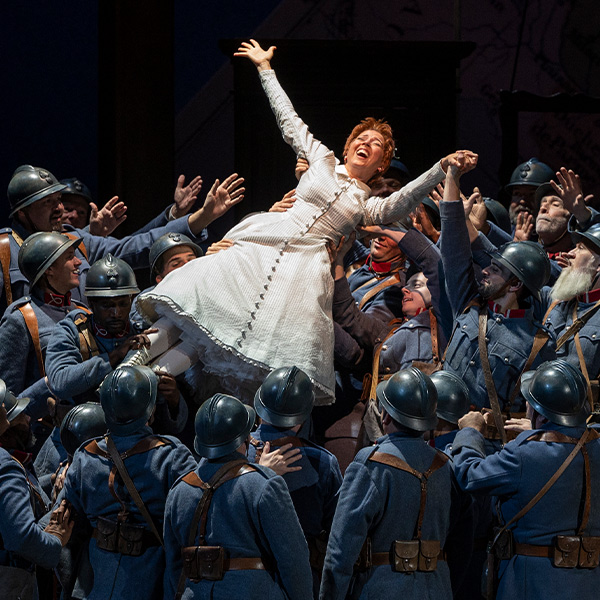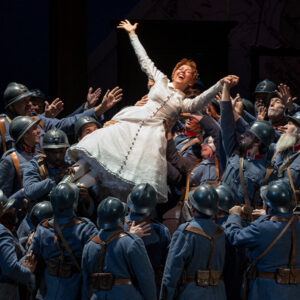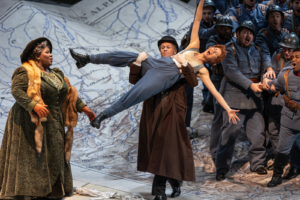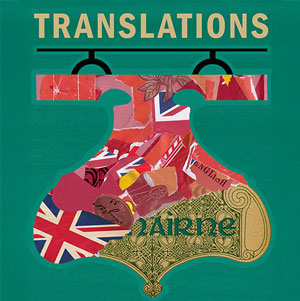
 ***** Despite having a storied history, Gaetano Donizetti’s 1840 farce The Daughter of the Regiment (La fille du régiment) has not often been seen on the stage of the Lyric Opera. However, the new-to-Chicago production originally directed by Laurent Pelly, with revival direction by Christian Räth, is a delightful showcase of the agile musical style the phrase “bel canto” was invented to describe, featuring familiar Lyric faces as well as new ones, and a highly dynamic as well as amusing staging. Love conquers all, the underdogs rise on their merit, families long torn asunder are reconciled. And if there’s a somewhat dark undercurrent to a show with complicated politics underneath its classic tropes, perhaps that makes the humor and emotions just a little sharper.
***** Despite having a storied history, Gaetano Donizetti’s 1840 farce The Daughter of the Regiment (La fille du régiment) has not often been seen on the stage of the Lyric Opera. However, the new-to-Chicago production originally directed by Laurent Pelly, with revival direction by Christian Räth, is a delightful showcase of the agile musical style the phrase “bel canto” was invented to describe, featuring familiar Lyric faces as well as new ones, and a highly dynamic as well as amusing staging. Love conquers all, the underdogs rise on their merit, families long torn asunder are reconciled. And if there’s a somewhat dark undercurrent to a show with complicated politics underneath its classic tropes, perhaps that makes the humor and emotions just a little sharper.
We open with the French army occupying the Italian-speaking part of Tyrol, and the Marquise de Berkenfield (mezzo Ronnita Miller) is caught on the wrong side of the line. The French regiment in the area is the legendary 21st, who raised a foundling, Marie (soprano Lisette Oropesa), as their canteen manager and mascot. (The Napoleonic Wars have been going on for as long as Marie has been alive.) Although they describe themselves as her father, the soldiers insist that she marry one of them. However, Marie loves a Tyrolean peasant, Tonio (tenor Lawrence Brownlee). She is also revealed to be the Marquise’s long-lost niece, making her romantic preference unsatisfactory to everyone else, albeit for different reasons. The Marquise tells Marie she has a duty to set aside her uncouth French life to become an Austro-Italian lady, the regiment demands that Tonio join the French army, and it seems that all Marie’s future holds is a loveless arranged marriage to save the fortune of a family she has never met.
Both a gifted singer of coloratura and an actor with a hilarious sense of comedic timing and physicality, Lawrence Brownlee is an ideal person to cast as Tonio. The most famous part of the opera in modern times is the aria “Ah! mes amis,” near the end of Act I, in which Tonio negotiates with the chorus of soldiers. This is an especially difficult but enjoyable piece of music that Brownlee handles very well, riding on the audience’s anticipation at the opening night to deliver an encore of one of the verses. This is unusual at the Lyric, but Brownlee has been a major asset to several productions there within the past few years. Making her Lyric debut is Lisette Oropesa as Marie. Oropesa matches Brownlee in charisma and plays Marie with a certain arch sensibility that helps sell French patriotic songs, including one flattering the regiment they tell her to perform as a power move over Tonio. Although Marie says that she has played the coquette for them, the original director Laurent Pelly, who also designed the costumes, makes her look like a pre-transformation Cinderella, instead of the more doll-like figure shown in historical productions. Oropesa is also a very funny performer; one of the running gags is that Marie is a poor singer in-universe, and her recital in Act II is a memorable example of good-bad singing.
Lovers of Donizetti’s music are in good hands with conductor Speranza Scappucci, who is also making her Lyric debut, and with the rest of the cast, which includes the duo of Ronnita Miller as the dramatic Marquise and bass-baritone Alan Higgs as her stuffy footman, Hortensius. Pelly and the revival director, Christian Räth, have a strong sense of how to stage large crowds to keep things moving without being confusing or contrived, and set designer Chantal Thomas has created an interesting but not distracting background by folding military maps into the shape of the Alps. But perhaps one of the most important contributions came from the dramaturg and librettist of new dialogues Agathe Mélinand. The Daughter of the Regiment is a story about France occupying Italy composed by an Italian to make French audiences feel pleased with themselves. And although Donizetti’s political sympathies were more with Napoleon than with the Austrians, and it was normal at that time for comedies to have some darker songs that could be excerpted for other purposes, there are there are odd moments, including several in the first few minutes, that disquiet the feel-good atmosphere. Despite being in an antagonistic role, the Marquise never does anything villainous, and the regiment is also an obstacle to true love while frequently being shown to be regarded with justifiable fear by Tyrolean civilians. But even comedies require some stakes, and the show wouldn’t still be around if it were only for mid-nineteenth century French bourgeois supporters of constitutional monarchy, however much it explicitly appeals to them. This production is an excellent staging of outstanding music, and one that brings plenty of joy, even if audiences detect a little bite.
The Daughter of the Regiment will continue at the Lyric Opera House, 20 N Upper Wacker Drive, Chicago, thru November 25, with the following showtimes:
 November 14: 7:00 pm
November 14: 7:00 pm
November 16: 2:00 pm
November 19: 2:00 pm
November 22: 2:00 pm
November 25: 7:30 pm
Running time is two hours and forty-five minutes with one intermission. There is also a thirty-minute preview talk an hour before the show.
Performances are in French with English supertitles.
Ticket prices start at $41. The Lyric offers parking deals with Poetry Garage at 201 W Madison St. if inquired about in advance. To order, visit LyricOpera.org or call 321-827-5600.
To see what others are saying, visit www.theatreinchicago.com, go to Review Round-Up and click “The Daughter of the Regiment.”






More Stories
“Translations”
“The Firebugs” reviewed by Julia W. Rath
“The Book of Grace” Al Bresloff with another from Paul LIsnek